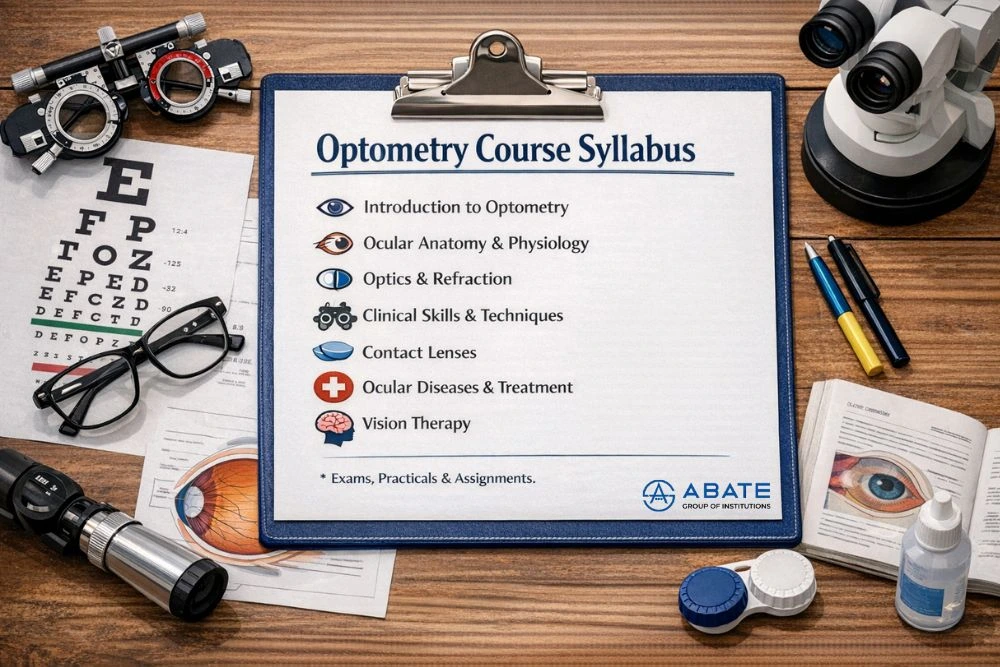Is B.Sc Optometry a Doctor? A Complete Guide to Understanding the Role of an Optometrist

When students choose a career in healthcare, one common question they ask is — “Is B.Sc Optometry a doctor?” The term “doctor” often creates confusion, especially when it comes to eye care professionals. Optometrists play a crucial role in maintaining eye health, but their designation and responsibilities differ from medical doctors (ophthalmologists). Let’s explore in detail what a B.Sc Optometry degree means, what optometrists do, and whether they can be called doctors.
What Is B.Sc Optometry?
Bachelor of Science in Optometry (B.Sc Optometry) is a four-year undergraduate program designed to train students in the science of vision care. It combines theoretical knowledge with hands-on clinical training to prepare students to diagnose and manage eye-related issues.
Key subjects covered include:
- Ocular anatomy and physiology
- Optics and refraction
- Visual science and binocular vision
- Contact lens fitting and low vision care
- Clinical optometry and ocular diseases
The program also includes a one-year internship where students gain real-world clinical experience under expert supervision.
Who Is an Optometrist?
An optometrist is a primary eye care professional who examines, diagnoses, and manages vision problems. They help people achieve clear vision by prescribing glasses or contact lenses and detecting early signs of eye diseases.
Roles and responsibilities of an optometrist:
- Conducting eye examinations and vision tests
- Prescribing corrective lenses
- Detecting eye conditions such as glaucoma, cataract, or diabetic retinopathy
- Offering vision therapy and low vision rehabilitation
- Referring patients to ophthalmologists for surgical or advanced care
Optometrists are vital members of the healthcare system, often being the first professionals to identify eye health problems.
Is B.Sc Optometry a Doctor?
The short answer is no — a B.Sc Optometry graduate is not a medical doctor. However, they are recognized as eye care professionals and doctors of optometry in professional practice settings.
Here’s the distinction:
- Optometrists hold a B.Sc or Doctor of Optometry (OD) degree and specialize in vision care.
- Ophthalmologists are medical doctors (MBBS + MS/MD in Ophthalmology) who perform surgeries and treat severe eye diseases.
In India, B.Sc Optometry graduates are referred to as Optometrists, not medical doctors. However, they are still addressed as “Doctor” in many clinical and optical practices as a sign of professional respect for their role in eye health management.
Why Optometry Is a Respected Profession
Even though B.Sc Optometry graduates are not medical doctors, their role in healthcare is indispensable. Optometrists bridge the gap between patients and ophthalmologists by offering preventive, diagnostic, and corrective eye care.
Reasons why Optometry is highly respected:
- They play a key role in preventing vision loss through early detection.
- Their work improves quality of life by enhancing visual comfort and performance.
- They work closely with other medical professionals to ensure holistic eye care.
- Optometrists contribute to research, teaching, and technological advancements in vision science.
With the growing screen time and digital eye strain, the need for skilled optometrists is rising rapidly, making it one of the most promising healthcare careers today.
Educational Path After B.Sc Optometry
If you’ve completed your B.Sc in Optometry and wish to advance your career, there are several options available:
- Doctor of Optometry (OD)
A postgraduate program that provides advanced clinical and diagnostic training, allowing professionals to specialize further. - Master’s in Optometry (M.Optom)
This program focuses on research and advanced optometric techniques. Graduates can work as senior optometrists, educators, or consultants. - Specialized Certifications
Short-term courses in contact lens fitting, pediatric optometry, or low vision rehabilitation help build niche expertise. - Career Opportunities Abroad
Optometrists trained in India can also qualify to practice internationally after meeting the licensing requirements in countries like the USA, UK, Australia, or Canada.
Career Scope for B.Sc Optometry Graduates
B.Sc Optometry opens up numerous professional opportunities across healthcare sectors.
Career options include:
- Clinical Optometrist in hospitals and eye clinics
- Vision consultant in optical chains
- Research associate in vision science
- Optometry educator in colleges and universities
- Entrepreneur in optical and eye care business
The field also offers rewarding opportunities in public health, tele-optometry, and industrial vision safety programs.
Optometry Education in South India
If you’re planning to pursue a career in optometry, choosing the right college is crucial. Institutions like Abate Group of Institutions in Kerala, Chennai, and Coimbatore offer high-quality optometry education with advanced clinical exposure.
At Abate, students can enroll in optometry courses in Kerala, which include comprehensive B.Sc Optometry programs combining academic learning with hands-on clinical training in leading eye hospitals.
Additionally, the Doctor of Optometry Course (4 Years B.Sc + 1 Year Doctor of Optometry) offered at the Chennai and Coimbatore branches provides an extended pathway for those seeking advanced clinical expertise and global recognition in the field. This makes Abate one of the best destinations for aspiring optometrists seeking both skill development and career growth.
Conclusion
So, is B.Sc Optometry a doctor? Technically, no — optometrists are not medical doctors, but they are specialized healthcare professionals dedicated to preserving and improving vision. Their expertise makes them an essential part of the eye care ecosystem.
Choosing optometry as a career offers a balance of science, service, and satisfaction — where you not only help people see better but also shape a rewarding professional future.
If you have a passion for healthcare and vision science, pursuing B.Sc Optometry could be the first step toward a meaningful and respected career.


